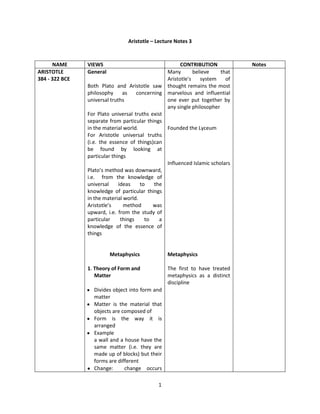
Handout 11-aristotle
- 1. Aristotle – Lecture Notes 3 NAME VIEWS CONTRIBUTION Notes ARISTOTLE General Many believe that 384 - 322 BCE Aristotle's system of Both Plato and Aristotle saw thought remains the most philosophy as concerning marvelous and influential universal truths one ever put together by any single philosopher For Plato universal truths exist separate from particular things in the material world. Founded the Lyceum For Aristotle universal truths (i.e. the essence of things)can be found by looking at particular things Influenced Islamic scholars Plato’s method was downward, i.e. from the knowledge of universal ideas to the knowledge of particular things in the material world. Aristotle’s method was upward, i.e. from the study of particular things to a knowledge of the essence of things Metaphysics Metaphysics 1. Theory of Form and The first to have treated Matter metaphysics as a distinct discipline Divides object into form and matter Matter is the material that objects are composed of Form is the way it is arranged Example a wall and a house have the same matter (i.e. they are made up of blocks) but their forms are different Change: change occurs 1
- 2. because the same matter can be arranged in different ways Permanence: even though the form of an object can change, it is form (the essence) that provides order and permanence Some aspects of the form change, the essential form does not. This determines what a thing is. Example: A seed changes as it develops into a tree. But these changes are not random. The essential form (what determines it to be a tree) does not change 2. Theory ofCausality (The Four Causes) How do things came into being? Aristotle says there are 4 kinds of causes: 1. The material cause What type of material it is made of 2. The formal cause What type/form of thing it is 3. The efficient cause What caused it to come into being 4. The final cause (teleology) The function for which it is done 3. Theory of Nature All things have an essential form that makes them what they are and a final state that they are heading to Example of an acorn and oak So all things are in motion. 2
- 3. By motion he means any kind of change 4. Theory of God God is the eternal cause of all motion And the ultimate final cause of all motion Everything that moves has a cause but God does not So God is the Unmoved Mover God is also the ultimate cause of all things. All things move towards God as their final state or goal. 5. Theory of the Soul Plato taught that the soul and body were distinct entities Aristotle that a human was a unified being The soul (psyche) was the animating force in the body Inseparable from the body ETHICS Ethics How should people live? Ethics as a subject begins What makes a person good? with Aristotle Everything that humans do is aimed at some good Three most common types of life. a life dedicated to pleasure a life dedicated to fame &honour a life dedicated to contemplation The highest human good is happiness The life which gives the greatest happiness is the 3
- 4. one that best uses reason because using reason is the essential attribute of a human Believed in the golden mean this was the middle between excess and deficiency (see below) LOGIC Logic All arguments can be reduced He single-handedly began to a simple form, called a the systematic treatment "syllogism." of Logic, Biology, and A syllogism is a set of three Psychology. statements, the third of which (the conclusion) was His logic was studied in necessarily true if the first two Europe during the Middle (the premises) were. Ages The most important logician in history because (1) he was the first to systematize it as a discipline and (2) his system was the dominant one for about 2,000 years Aristotle made note (and Plato agreed) that moral virtue is about the exercise of control over natural feelings, and that good values is indicated through the use of good judgment in finding an effective balance between extremes. Aristotle thus had a personal value of moderation. In his Nicomachean Ethics, he gave examples: VICE (Defect) VIRTUE VICE (Excess) (Mean) Cowardice (too little Courage Rashness (too much confidence) confidence) Foolhardiness (too little fear) Courage Cowardice (too much fear) 4
- 5. Insensibility (too little Temperance Self-indulgence (too much pleasure) pleasure) Meanness or Stinginess (too Liberality Prodigality or Wastefulness little giving) (too much giving) Niggardliness (in giving out Magnificence Tastlessness and Vulgarity large sums of money) (giving out large sums) Undue Humility (too little Proper Pride Empty Vanity (too much honor) honor) Inirascibility (too little anger) Good Temper Irascible (too much anger) Shamelessness (too little Modesty Bashfulness (too much shame) shame) Surliness Friendliness Flattery 5